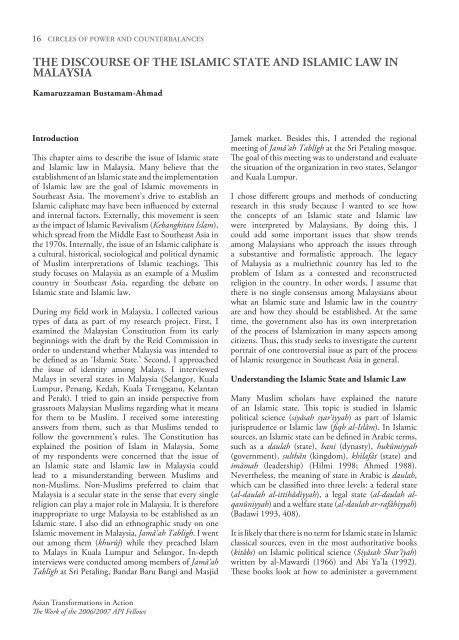Asian Transformations in Action - Api-fellowships.org
Asian Transformations in Action - Api-fellowships.org
Asian Transformations in Action - Api-fellowships.org
Create successful ePaper yourself
Turn your PDF publications into a flip-book with our unique Google optimized e-Paper software.
16CIRCLES OF POWER AND COUNTERBALANCESTHE DISCOURSE OF THE ISLAMIC STATE AND ISLAMIC LAW INMALAYSIAKamaruzzaman Bustamam-AhmadIntroductionThis chapter aims to describe the issue of Islamic stateand Islamic law <strong>in</strong> Malaysia. Many believe that theestablishment of an Islamic state and the implementationof Islamic law are the goal of Islamic movements <strong>in</strong>Southeast Asia. The movement’s drive to establish anIslamic caliphate may have been <strong>in</strong>fluenced by externaland <strong>in</strong>ternal factors. Externally, this movement is seenas the impact of Islamic Revivalism (Kebangkitan Islam),which spread from the Middle East to Southeast Asia <strong>in</strong>the 1970s. Internally, the issue of an Islamic caliphate isa cultural, historical, sociological and political dynamicof Muslim <strong>in</strong>terpretations of Islamic teach<strong>in</strong>gs. Thisstudy focuses on Malaysia as an example of a Muslimcountry <strong>in</strong> Southeast Asia, regard<strong>in</strong>g the debate onIslamic state and Islamic law.Dur<strong>in</strong>g my field work <strong>in</strong> Malaysia, I collected varioustypes of data as part of my research project. First, Iexam<strong>in</strong>ed the Malaysian Constitution from its earlybeg<strong>in</strong>n<strong>in</strong>gs with the draft by the Reid Commission <strong>in</strong>order to understand whether Malaysia was <strong>in</strong>tended tobe def<strong>in</strong>ed as an ‘Islamic State.’ Second, I approachedthe issue of identity among Malays. I <strong>in</strong>terviewedMalays <strong>in</strong> several states <strong>in</strong> Malaysia (Selangor, KualaLumpur, Penang, Kedah, Kuala Trengganu, Kelantanand Perak). I tried to ga<strong>in</strong> an <strong>in</strong>side perspective fromgrassroots Malaysian Muslims regard<strong>in</strong>g what it meansfor them to be Muslim. I received some <strong>in</strong>terest<strong>in</strong>ganswers from them, such as that Muslims tended tofollow the government’s rules. The Constitution hasexpla<strong>in</strong>ed the position of Islam <strong>in</strong> Malaysia. Someof my respondents were concerned that the issue ofan Islamic state and Islamic law <strong>in</strong> Malaysia couldlead to a misunderstand<strong>in</strong>g between Muslims andnon-Muslims. Non-Muslims preferred to claim thatMalaysia is a secular state <strong>in</strong> the sense that every s<strong>in</strong>glereligion can play a major role <strong>in</strong> Malaysia. It is therefore<strong>in</strong>appropriate to urge Malaysia to be established as anIslamic state. I also did an ethnographic study on oneIslamic movement <strong>in</strong> Malaysia, Jamâ‘ah Tabligh. I wentout among them (khurûj) while they preached Islamto Malays <strong>in</strong> Kuala Lumpur and Selangor. In-depth<strong>in</strong>terviews were conducted among members of Jamâ‘ahTablîgh at Sri Petal<strong>in</strong>g, Bandar Baru Bangi and MasjidJamek market. Besides this, I attended the regionalmeet<strong>in</strong>g of Jamâ‘ah Tablîgh at the Sri Petal<strong>in</strong>g mosque.The goal of this meet<strong>in</strong>g was to understand and evaluatethe situation of the <strong>org</strong>anization <strong>in</strong> two states, Selangorand Kuala Lumpur.I chose different groups and methods of conduct<strong>in</strong>gresearch <strong>in</strong> this study because I wanted to see howthe concepts of an Islamic state and Islamic lawwere <strong>in</strong>terpreted by Malaysians. By do<strong>in</strong>g this, Icould add some important issues that show trendsamong Malaysians who approach the issues througha substantive and formalistic approach. The legacyof Malaysia as a multiethnic country has led to theproblem of Islam as a contested and reconstructedreligion <strong>in</strong> the country. In other words, I assume thatthere is no s<strong>in</strong>gle consensus among Malaysians aboutwhat an Islamic state and Islamic law <strong>in</strong> the countryare and how they should be established. At the sametime, the government also has its own <strong>in</strong>terpretationof the process of Islamization <strong>in</strong> many aspects amongcitizens. Thus, this study seeks to <strong>in</strong>vestigate the currentportrait of one controversial issue as part of the processof Islamic resurgence <strong>in</strong> Southeast Asia <strong>in</strong> general.Understand<strong>in</strong>g the Islamic State and Islamic LawMany Muslim scholars have expla<strong>in</strong>ed the natureof an Islamic state. This topic is studied <strong>in</strong> Islamicpolitical science (siyâsah syar‘iyyah) as part of Islamicjurisprudence or Islamic law (fiqh al-Islâm). In Islamicsources, an Islamic state can be def<strong>in</strong>ed <strong>in</strong> Arabic terms,such as a daulah (state), bani (dynasty), hukûmiyyah(government), sulthân (k<strong>in</strong>gdom), khilafât (state) andimâmah (leadership) (Hilmi 1998; Ahmed 1988).Nevertheless, the mean<strong>in</strong>g of state <strong>in</strong> Arabic is daulah,which can be classified <strong>in</strong>to three levels: a federal state(al-daulah al-ittihâdiyyah), a legal state (al-daulah alqanûniyyah)and a welfare state (al-daulah ar-rafâhiyyah)(Badawi 1993, 408).It is likely that there is no term for Islamic state <strong>in</strong> Islamicclassical sources, even <strong>in</strong> the most authoritative books(kitâbs) on Islamic political science (Siyâsah Shar’îyah)written by al-Mawardi (1966) and Abi Ya’la (1992).These books look at how to adm<strong>in</strong>ister a government<strong>Asian</strong> <strong>Transformations</strong> <strong>in</strong> <strong>Action</strong>The Work of the 2006/2007 API Fellows
















